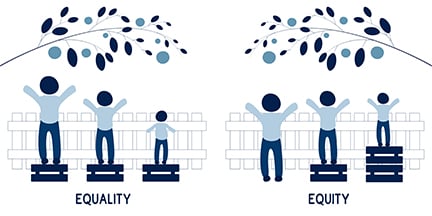Health Equity
Health equity is achieved when every person has the opportunity to “attain his or her full health potential” and no one is “disadvantaged from achieving this potential because of social position or other socially determined circumstances.”
“Health equity is about more than individuals or individual behavior; it’s also about the history and context of places and systems. It’s about system-level factors contributing to inequities in health and opportunities...” – Dr. Lisa Cooper
Health inequities are reflected in differences in length of life; quality of life; rates of disease, disability, and death; severity of disease; and access to treatment.

Significant inequities in kidney disease rates and outcomes exist among racial, ethnic and socioeconomic lines. Social determinants of health (SDOH), defined by Healthy People 2020 as the conditions under which people are born, grow, live, work and age, are significant contributors to health inequities among individuals with kidney disease.
A central goal of Network 4 is to advance health equity by eliminating health disparities and inequities and achieving optimal kidney health. Network 4 aims to address health equity through its projects and programs, trainings, education, and engagement, tools and resources, partnerships with patients and families, community-based organizations, leadership, and other stakeholders.
Explore the links below to learn more about advancing health equity among the kidney disease community, and access information on health equity and racial and ethnic disparities in kidney disease.




